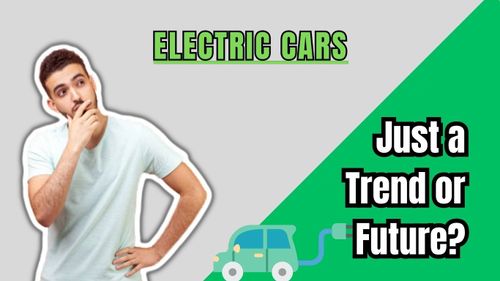Are people buying electric cars just for the Trend to “go green”?
By Mohit Kumar

39530 Views
Explore the motivations behind the rise in electric car sales and the potential impact on the automotive industry in this informative article.

Table of Content
- Introduction
- Increasing Demand for Electric Vehicles
- Electric cars and their benefits
- The trend to "go green
- Consumer motivations for buying electric cars
- Criticisms of the trend to "go green
- Advancements in Battery Technology
- Infrastructure and Charging Networks
- Integration with Renewable Energy
- Potential Challenges
- Conclusion
Introduction:
Electric cars are vehicles that use one or more electric motors to run on electrical energy stored in rechargeable batteries. The trend to "go green" is a growing movement towards more sustainable and environmentally friendly choices.
It encompasses a wide range of products and industries that aim to reduce negative environmental impact and promote a more sustainable future. The main question of this article is whether people are buying electric cars mainly because of this trend, or if there are other motivations.
Electric vehicles (EVs) are becoming increasingly popular as people become more aware of the environmental impact of traditional fossil fuel-powered vehicles. As technology advances and more manufacturers enter the market, the future of EVs looks promising. In this article, we will explore the future of EVs, including the potential for growth, advancements in technology, and potential challenges.
Increasing Demand for Electric Vehicles:

According to a report by the International Energy Agency, global sales of electric cars increased by 41% in 2020, despite the COVID-19 pandemic. This trend is expected to continue as more countries set targets for phasing out traditional gasoline-powered vehicles. EV industry records 155% growth and sold more than a million units in FY2023.
For example, Norway plans to only allow the sale of EVs by 2025, and the UK plans to ban the sale of new gasoline-powered vehicles by 2030. As more governments incentivize the adoption of EVs, and more consumers become aware of their benefits, the demand for EVs is expected to continue to rise.
Electric cars and their benefits:
Electric cars offer several advantages over traditional gasoline-powered cars. They are more energy-efficient, which means they require less energy to travel the same distance as a gasoline-powered car.
This is because electric motors convert up to 80% of the energy from the batteries into motion, while internal combustion engines only convert about 20% of the energy from gasoline into motion.
Electric cars are also quieter and emit less pollution, making them more environmentally friendly. In addition to these benefits, electric cars have the potential to reduce dependence on foreign oil and improve national security.
The trend to "go green":
The trend to "go green" refers to a growing movement towards more sustainable and environmentally friendly choices. This trend has influenced a wide range of industries and products, from energy-efficient light bulbs to reusable shopping bags.
The trend is driven by a desire to reduce negative environmental impact and promote a more sustainable future. It has gained momentum in recent years due to concerns over climate change and the depletion of natural resources.
Consumer motivations for buying electric cars:
Consumers may have different motivations for buying electric cars. One of the main motivations is environmental concerns, as electric cars emit less pollution and greenhouse gases than gasoline-powered cars.
This makes them more environmentally friendly and appealing to consumers who are concerned about the impact of their actions on the environment. Financial incentives, such as tax credits or lower operating costs, can also motivate consumers to purchase electric cars.
For example, some countries offer tax incentives for buying electric cars or waive toll fees for electric car owners. Finally, some consumers may be motivated by the performance and driving experience of electric cars, which can be different from traditional cars. Electric cars offer instant torque and smoother acceleration, providing a unique driving experience.
Criticisms of the trend to "go green":
The trend to "go green" has faced criticism from some quarters. One criticism is that the environmental benefits of electric cars may be overstated, particularly if the electricity used to power them is generated by non-renewable sources such as coal-fired power plants.
This can negate the benefits of electric cars and contribute to air pollution. Another criticism is that the financial incentives for electric cars, such as tax credits, unfairly benefit wealthy consumers who can afford to buy electric cars. Critics argue that this is not an effective way to promote the widespread adoption of electric cars.
Advancements in Battery Technology:
One of the main challenges for EVs is the limited range of their batteries. However, advancements in battery technology are addressing this challenge. Newer lithium-ion batteries can store more energy, and solid-state batteries are expected to offer even greater energy density, longer range, and faster charging times.
Additionally, research is being conducted on other types of batteries, such as zinc-air and lithium-sulfur batteries, which have the potential to be cheaper, lighter, and more environmentally friendly than current batteries.
Infrastructure and Charging Networks:
Another challenge facing the widespread adoption of EVs is the need for infrastructure and charging networks. As more EVs hit the road, there will be greater demand for charging stations. Governments and private companies are investing in building more charging stations, with some even offering ultra-fast charging capabilities. Additionally, advancements in wireless charging technology could make charging more convenient and accessible.
Integration with Renewable Energy:
As more renewable energy sources, such as solar and wind power, are integrated into the energy grid, EVs have the potential to become even more environmentally friendly. With the use of smart charging and vehicle-to-grid technology, EVs can charge during times of surplus renewable energy, and discharge back to the grid during times of high demand. This integration could also help reduce strain on the grid during peak usage times.
Potential Challenges:
While the future of EVs looks promising, there are still some potential challenges. One challenge is the availability of raw materials needed for batteries, such as cobalt and lithium. As demand for these materials increases, prices could rise, making EVs less accessible for some consumers. Additionally, the cost of EVs is currently higher than traditional gasoline-powered vehicles, although this is expected to decrease as production increases and technology advances.
Conclusion:
In conclusion, while the trend to "go green" may be a factor in the growing popularity of electric cars, there are also other motivations driving consumer behaviour.
Electric cars offer several advantages over traditional gasoline-powered cars, including energy efficiency, reduced pollution, and improved national security. Consumer motivations for buying electric cars may include environmental concerns, financial incentives, and the unique driving experience that electric cars offer.
While the trend to "go green" has faced criticism, it remains an important driver of sustainable and environmentally friendly choices.
The future of EVs looks bright, with increasing demand, advancements in battery technology, and integration with renewable energy. As infrastructure and charging networks continue to expand, and the cost of EVs decreases, more consumers are expected to make the switch to electric.
However, challenges such as the availability of raw materials and the cost of EVs will need to be addressed. As technology continues to advance, and more governments and private companies invest in the adoption of EVs, the future of transportation looks to be more sustainable and environmentally friendly.